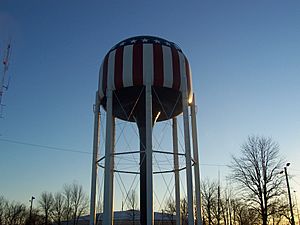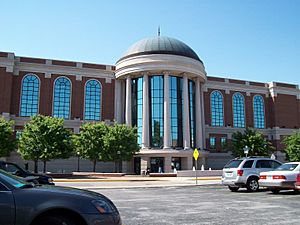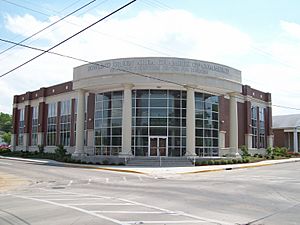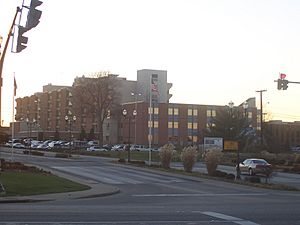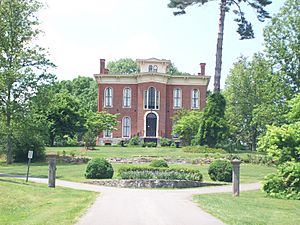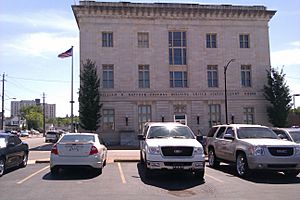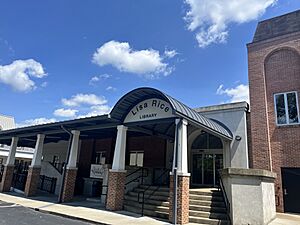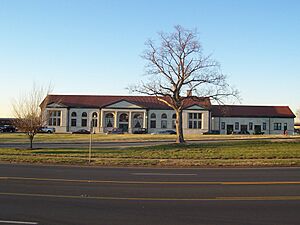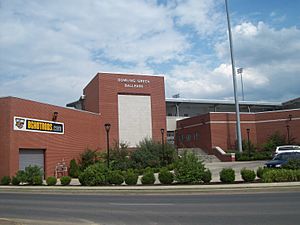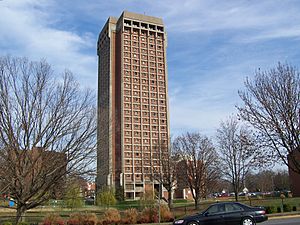Bowling Green, Kentucky facts for kids
Quick facts for kids
Bowling Green, Kentucky
|
||
|---|---|---|
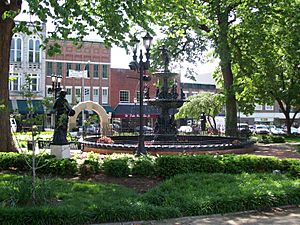
Fountain Square Park, 2008
|
||
|
||
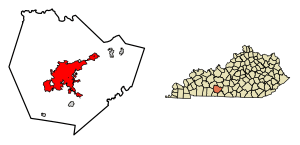
Location of Bowling Green in Warren County, Kentucky
|
||
| Country | United States | |
| State | Kentucky | |
| County | Warren | |
| Area | ||
| • City | 40.65 sq mi (105.28 km2) | |
| • Land | 40.39 sq mi (104.61 km2) | |
| • Water | 0.26 sq mi (0.67 km2) | |
| Elevation | 547 ft (167 m) | |
| Population
(2020)
|
||
| • City | 72,294 | |
| • Estimate
(2023)
|
76,212 | |
| • Rank | Kentucky: 3rd | |
| • Density | 1,789.81/sq mi (691.05/km2) | |
| • Metro | 179,639 (US: 245th) | |
| Time zone | UTC−6 (CST) | |
| • Summer (DST) | UTC−5 (CDT) | |
| ZIP codes |
42101-42104
|
|
| Area code(s) | 270 & 364 | |
| FIPS code | 21-08902 | |
Bowling Green is a cool city in Kentucky, United States. It's the main city of Warren County, Kentucky. In 2020, about 72,294 people lived here. This makes it the third-largest city in Kentucky. The larger area around Bowling Green is also home to many people, with about 179,639 residents in 2020.
Pioneers first settled Bowling Green in 1798. During the American Civil War, it was even the temporary capital for the Confederate side of Kentucky. Today, Bowling Green is a hub for many factories. Big companies like General Motors, Spalding, and Fruit of the Loom have plants here. The Bowling Green Assembly Plant is super famous because it's where every single Chevrolet Corvette car has been made since 1981! The city is also home to Western Kentucky University and the awesome National Corvette Museum.
Contents
History of Bowling Green
Early Settlement and Growth
The first Europeans came to this area around 1775. They even carved their names on trees near the river. By 1778, settlers built a place called McFadden's Station.
Today's Bowling Green grew from homes built by Robert and George Moore. General Elijah Covington also helped settle the area.
There's a fun story about how the town got its name. Some say it was named "Bolin Green" in 1798. This was after a place in New York City called Bowling Green. Patriots there pulled down a statue of King George III. They used the lead to make bullets during the American Revolution. Another idea is that the name came from Bowling Green, Virginia. Many early settlers came from there. Or, it might be from a "ball alley game" played by founder Robert Moore.
By 1810, Bowling Green had 154 people. The city grew because of steamboat trade on the Barren River. In 1821, a toll road was built to Cloverport, Kentucky on the Ohio River. Locks and dams made the Barren River easier to travel. In 1832, a special railway connected the river to the courthouse. Mules pulled goods and people on these tracks.
Even with city growth, farming was still very important. People grew huge vegetables! One person said they saw a turnip 32 inches around. They also had a beet that weighed over 16 pounds!
In 1859, the Louisville and Nashville Railroad came to Bowling Green. This connected the city to markets in the north and south.
Bowling Green During the Civil War
Bowling Green tried to stay neutral during the Civil War. But its location and resources were too important. Both the Union and Confederate armies wanted control. Many residents didn't support either side.
On September 18, 1861, about 1,300 Confederate soldiers arrived. They took over the city. The Confederates built forts on nearby hills. In November 1861, Bowling Green became the temporary capital for the Confederate government in Kentucky.
On February 14, 1862, Union forces captured nearby forts. The Confederates then left Bowling Green. They destroyed bridges and buildings so the Union couldn't use them. The city faced many problems during the rest of the war.
Growth After the Civil War
After the Civil War, Bowling Green's business area grew a lot. Before, farming was the main business. In the 1870s, many historic buildings were built. Carie Burnam Taylor's dress-making company was very important. By 1906, she employed over 200 women.
In 1868, the city built its first water system. A new county courthouse was finished in 1868. In 1889, the first streetcars pulled by mules appeared. Electric streetcars started replacing them by 1895.
Many schools were founded in this era. St. Columbia's Academy opened in 1862. The Southern Normal School moved to Bowling Green in 1884. Pleasant J. Potter started a women's college in 1889. These schools helped educate many people.
20th Century Changes
In 1906, Henry Hardin Cherry gave his Southern Normal School to the state. It became the Western State Normal School. This school trained teachers for Kentucky. Today, it's Western Kentucky University, the second-largest public university in the state.
In 1906, doctors opened St. Joseph Hospital. It provided medical care for everyone.
The last train station opened in 1925. About 27 trains arrived daily! But by the 1960s, fewer people traveled by train. The station is now a museum.
In 1940, a Union Underwear factory opened. This really boosted the city's economy. By the 1960s, Bowling Green's population grew larger than other Kentucky cities.
Traffic became a problem downtown. In 1949, the U.S. Route 31W Bypass opened. This helped with traffic but also moved businesses away from downtown. The bypass became a new business hot spot.
Shopping also changed. People started going to suburban shopping centers instead of downtown. The Bowling Green Mall opened in 1967. Later, the larger Greenwood Mall opened in 1979-1980. The city limits began to grow towards Interstate 65.
By the late 1960s, Interstate 65 was finished. The Green River Parkway (now I-165) was completed in the 1970s. These highways brought many new industries to Bowling Green.
In 1981, General Motors moved its Chevrolet Corvette factory to Bowling Green. Since then, all Corvettes have been made here! The National Corvette Homecoming event started in the same year. It's a huge yearly gathering for Corvette owners. In 1994, the National Corvette Museum was built near the factory.
In 1997, Bowling Green was named a Tree City USA. This means it cares about its trees and green spaces.
Bowling Green in the 21st Century
In 2012, the city started a plan to make downtown Bowling Green even better. They wanted to use the riverfront and historic areas. New projects included a building for the Chamber of Commerce, a Riverwalk Park, and Circus Square.
The new Chamber of Commerce, Riverwalk Park, and Circus Square are now finished. The Southern Kentucky Performing Arts Center (SkyPac) opened in 2012. It's a great place for arts and education.
In 2011, a group worked to develop land across the Barren River. Plans include areas for white-water sports. There will also be a mountain biking trail, a bicycle pump track, and a rock climbing area.
2021 Tornadoes
On December 11, 2021, two strong tornadoes hit Bowling Green. The first was an EF3 tornado. It damaged many buildings and homes. Sadly, seventeen people lost their lives. The second tornado was an EF2. It caused more damage in the southern and eastern parts of the city.
Geography and Climate
Where is Bowling Green?
The Bowling Green-Warren County Regional Airport is about 547 feet (167 meters) above sea level. The city covers about 35.6 square miles (92.2 square kilometers). Most of this is land, with a small part covered by water.
Nearby Cities
| Brownsville | Franklin | Glasgow | |
| Morgantown | Russellville | Scottsville | Auburn |
Weather in Bowling Green
Bowling Green has a humid subtropical climate. This means it has hot, humid summers and mild winters. The average temperature in January is about 35.7°F (2.1°C). In July, it's about 78.7°F (25.9°C).
The city usually has about 41 days a year where the temperature reaches 90°F (32°C) or higher. In winter, there are about 11 days when the temperature stays below freezing. Bowling Green gets about 50.12 inches (127.3 cm) of rain each year. Snowfall averages about 9.1 inches (23.1 cm) per year.
| Climate data for Bowling Green, Kentucky (Warren County Airport), 1991–2020 normals, extremes 1893–present | |||||||||||||
|---|---|---|---|---|---|---|---|---|---|---|---|---|---|
| Month | Jan | Feb | Mar | Apr | May | Jun | Jul | Aug | Sep | Oct | Nov | Dec | Year |
| Record high °F (°C) | 78 (26) |
82 (28) |
92 (33) |
96 (36) |
100 (38) |
110 (43) |
113 (45) |
110 (43) |
105 (41) |
98 (37) |
88 (31) |
78 (26) |
113 (45) |
| Mean maximum °F (°C) | 66.9 (19.4) |
71.5 (21.9) |
79.0 (26.1) |
84.3 (29.1) |
89.2 (31.8) |
94.7 (34.8) |
96.2 (35.7) |
97.0 (36.1) |
93.2 (34.0) |
85.9 (29.9) |
76.6 (24.8) |
68.3 (20.2) |
98.6 (37.0) |
| Mean daily maximum °F (°C) | 46.2 (7.9) |
51.0 (10.6) |
60.1 (15.6) |
70.7 (21.5) |
78.7 (25.9) |
86.6 (30.3) |
89.7 (32.1) |
89.3 (31.8) |
83.0 (28.3) |
72.0 (22.2) |
59.2 (15.1) |
49.4 (9.7) |
69.7 (20.9) |
| Daily mean °F (°C) | 37.2 (2.9) |
41.1 (5.1) |
49.2 (9.6) |
59.0 (15.0) |
68.0 (20.0) |
76.1 (24.5) |
79.7 (26.5) |
78.5 (25.8) |
71.4 (21.9) |
60.0 (15.6) |
48.4 (9.1) |
40.5 (4.7) |
59.1 (15.1) |
| Mean daily minimum °F (°C) | 28.3 (−2.1) |
31.1 (−0.5) |
38.3 (3.5) |
47.3 (8.5) |
57.2 (14.0) |
65.6 (18.7) |
69.7 (20.9) |
67.7 (19.8) |
59.9 (15.5) |
48.0 (8.9) |
37.6 (3.1) |
31.6 (−0.2) |
48.5 (9.2) |
| Mean minimum °F (°C) | 7.5 (−13.6) |
12.9 (−10.6) |
20.2 (−6.6) |
30.3 (−0.9) |
40.7 (4.8) |
52.1 (11.2) |
59.2 (15.1) |
56.6 (13.7) |
44.3 (6.8) |
31.3 (−0.4) |
21.2 (−6.0) |
14.2 (−9.9) |
5.5 (−14.7) |
| Record low °F (°C) | −21 (−29) |
−20 (−29) |
−6 (−21) |
19 (−7) |
30 (−1) |
39 (4) |
46 (8) |
42 (6) |
33 (1) |
19 (−7) |
−7 (−22) |
−14 (−26) |
−21 (−29) |
| Average precipitation inches (mm) | 3.64 (92) |
4.07 (103) |
4.54 (115) |
4.81 (122) |
5.03 (128) |
4.51 (115) |
4.28 (109) |
3.89 (99) |
3.64 (92) |
3.63 (92) |
3.73 (95) |
4.35 (110) |
50.12 (1,273) |
| Average snowfall inches (cm) | 3.3 (8.4) |
3.3 (8.4) |
1.1 (2.8) |
0.2 (0.51) |
0.0 (0.0) |
0.0 (0.0) |
0.0 (0.0) |
0.0 (0.0) |
0.0 (0.0) |
0.0 (0.0) |
0.0 (0.0) |
1.2 (3.0) |
9.1 (23) |
| Average precipitation days (≥ 0.01 in) | 11.3 | 10.7 | 11.9 | 11.6 | 11.8 | 11.1 | 11.0 | 8.8 | 8.0 | 8.8 | 9.5 | 11.5 | 126.0 |
| Average snowy days (≥ 0.1 in) | 2.1 | 2.2 | 0.7 | 0.1 | 0.0 | 0.0 | 0.0 | 0.0 | 0.0 | 0.0 | 0.0 | 1.4 | 6.5 |
| Source: NOAA (snow 1981–2010) | |||||||||||||
People of Bowling Green
| Historical population | |||
|---|---|---|---|
| Census | Pop. | %± | |
| 1800 | 41 | — | |
| 1810 | 154 | 275.6% | |
| 1830 | 821 | — | |
| 1870 | 4,574 | — | |
| 1880 | 5,114 | 11.8% | |
| 1890 | 7,803 | 52.6% | |
| 1900 | 8,226 | 5.4% | |
| 1910 | 9,173 | 11.5% | |
| 1920 | 9,638 | 5.1% | |
| 1930 | 12,348 | 28.1% | |
| 1940 | 14,585 | 18.1% | |
| 1950 | 18,347 | 25.8% | |
| 1960 | 28,338 | 54.5% | |
| 1970 | 36,705 | 29.5% | |
| 1980 | 40,450 | 10.2% | |
| 1990 | 40,641 | 0.5% | |
| 2000 | 49,296 | 21.3% | |
| 2010 | 58,067 | 17.8% | |
| 2020 | 72,294 | 24.5% | |
| 2022 (est.) | 74,926 | 29.0% | |
| U.S. Decennial Census | |||
In 2020, Bowling Green had 72,294 residents. The city is quite diverse. About 64.3% of people were White, 13.8% African American, and 8.0% Asian. About 7.1% were from two or more races. About 5.6% of the population was Hispanic or Latino.
There were 27,504 households in the city. About 30.7% of these had kids under 18 living there. The average household had 2.34 people. The average family had 3.02 people.
The median age in the city was 27.6 years old. This means half the people were younger than 27.6, and half were older. About 21.4% of the population was under 18. About 26.7% were between 15 and 24 years old.
The median income for a household was $42,044. For families, it was $50,853. About 25.9% of the population lived below the poverty line. This included 32.7% of those under 18.
Economy and Jobs
Western Kentucky University is the biggest employer in Bowling Green. In 2022, WKU employed 3,274 people. Their salaries make up about 10% of all income in Warren County.
The General Motors Bowling Green Assembly Plant opened in 1981. By 2023, it had made about 1.1 million Chevrolet Corvettes! In 2022, GM employed about 1,100 people here. The workers at the plant are part of a union.
Holley Performance Products, a car parts company, has made products in Bowling Green since 1952. They have been based here since 1994. Kobe Steel Ltd. from Japan also has a large factory. They make aluminum parts for car bumpers and frames.
Camping World Holdings Inc., an RV company, started in Bowling Green in 1966. They still have one of their main offices here. In 2022, AESC, a Japanese company, announced plans for a huge electric vehicle battery factory. This "gigafactory" will create about 2,000 jobs!
Fruit of the Loom, a clothing company, has its main office in Bowling Green. They employ about 930 people here. Houchens Industries, a large company owned by its employees, is also based in Bowling Green. The Swedish company SCA opened a factory here in 1988.
Top Employers in Bowling Green
Here are the top employers in the city as of 2022:
| # | Employer | # of Employees |
|---|---|---|
| 1 | Western Kentucky University | 3,274 |
| 2 | Commonwealth Health Corporation | 2,842 |
| 3 | BG Metalforming LLC | 1,258 |
| 4 | Warren County Board of Education | 1,185 |
| 5 | General Motors Corporation | 1,100 |
| 6 | Graves-Gilbert Clinic PSC | 1,079 |
| 7 | Union Underwear Co. LLC | 930 |
| 8 | Henkel Corporation | 930 |
| 9 | Houchens Food Group | 899 |
| 10 | Kentucky State Treasurer | 717 |
Fun Things to Do and See
Museums to Explore
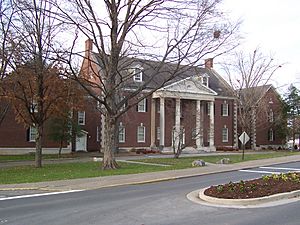
- Kentucky Museum and Library – This museum has amazing collections. You can learn about Kentucky's history and heritage.
- National Corvette Museum – See America's sports car up close! There are over 75 Corvettes on display. You'll find classic cars, unique prototypes, and race champions.
- Historic Railpark and Train Museum – L & N Depot – This train museum is in the old train station. It has 5 restored historic rail cars.
- Riverview at Hobson Grove – This historic house is a beautiful example of Italianate architecture. It has arched windows and painted ceilings. It was built in the 1850s and finished in 1872.
Other Cool Attractions
- Bowling Green Ballpark
- Beech Bend Park (amusement park)
- General Motors Assembly Plant (Corvette factory)
- National Corvette Homecoming (annual car event)
- Capitol Arts Center
- Cave Spring Caverns
- Lost River Cave and Valley
- Southern Kentucky Performing Arts Center (SkyPac)
- Low Hollow Bike Trail at Weldon Peete Park
- Civil War Discovery Trail
- Duncan Hines Scenic Byway
- Shake Rag Historic District
- Warren County Quilt Trail
Public Library
The Warren County Public Library serves Bowling Green. The main library is called the Lisa Rice Library. You can find more info at warrenpl.org.
Sports and Recreation
Sports Venues
E.A. Diddle Arena is on the Western Kentucky University campus. It's a large arena that holds 7,500 people. It hosts college sports like basketball and volleyball. It also hosted high school basketball championships for many years. You might even see rodeos or circuses here!
Bowling Green Ballpark is a baseball stadium. It's home to the Bowling Green Hot Rods. They are a High-A baseball team. They are a farm team for the Tampa Bay Rays of Major League Baseball.
Parks and Fun Spots
The Bowling Green Parks and Recreation Department manages 895 acres (3.6 square kilometers) of public land. This land is used for lots of fun activities.
Community Centers
- F. O. Moxley – This center has a game room, board game room, and concession stand. It also has courts for racquetball, wallyball, and basketball.
- Parker-Bennett – You can rent this facility for meetings, parties, and receptions.
- Kummer/Little Recreation Center – This center has basketball and volleyball courts. It also has a concession stand and walking trails.
- Delafield Community Center – This facility includes an auditorium, basketball courts, a playground, and picnic shelters.
Swimming Centers
You can go swimming at the Russell Sims Aquatic Center and the Warren County Aquatics Facility.
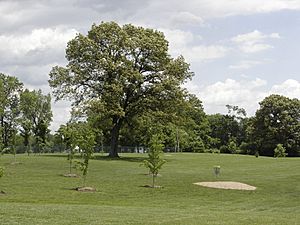
Education in Bowling Green
Schools for Kids
Public schools are managed by two districts. The Bowling Green Independent School District serves the inner city. The Warren County Public Schools serve the outer areas. There are also several private schools.
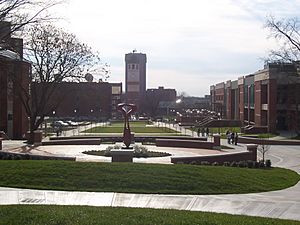
Elementary Schools (Grades K-5)
Warren County Public Schools
- Alvaton Elementary
- Briarwood Elementary
- Bristow Elementary
- Cumberland Trace Elementary
- Jennings Creek Elementary
- Jody Richards Elementary
- Lost River Elementary
- North Warren Elementary
- Oakland Elementary
- Plano Elementary
- Rich Pond Elementary
- Richardsville Elementary
- Rockfield Elementary
- Warren Elementary
- William H. Natcher Elementary
Bowling Green Independent School District
- Dishman-McGinnis
- Parker Bennett Curry
- Potter Gray
- T.C. Cherry
- W.R. McNeill
Middle Schools (Grades 6-8)
- Bowling Green Junior High
- Drakes Creek Middle School
- Henry F. Moss Middle School
- South Warren Middle School
- Warren East Middle School
High Schools (Grades 9-12)
- Bowling Green High
- Carol Martin Gatton Academy of Mathematics and Science in Kentucky
- Greenwood High
- Lighthouse Academy High School
- South Warren High School
- Warren Central High
- Warren East High
Religious Schools
- Legacy Christian Academy (Preschool-12th grade)
- Foundation Christian Academy (Preschool-12th grade)
- Holy Trinity Lutheran (Preschool-6th grade)
- Old Union School (Preschool-12th grade)
- Saint Joseph Interparochial School (Preschool-8th grade)
Colleges and Universities
- Bowling Green Adult Learning Center
- Southcentral Kentucky Community and Technical College
- Western Kentucky University
Media and Communication
Local News and Entertainment
- Print Media:
- The Amplifier – A monthly magazine about arts and entertainment.
- Bowling Green Daily News – The local newspaper.
- College Heights Herald – The student newspaper at WKU.
- Soky Happenings – Another local publication.
- Television Channels:
- WDNZ-LD (Channel 11) – Antenna TV
- WBKO (Channel 13) – ABC
- WKYU-TV (Channel 24) – PBS
- WCZU-LD (Channel 39) – Court TV
- WNKY (Channel 40) – NBC
- WKGB-TV (Channel 53) – PBS/KET
- Radio Stations:
- AM 930 WKCT – News/Talk
- AM 1340 WBGN – The Ticket (Fox Sports Radio)
- AM 1450 WWKU – ESPN Radio
- FM 88.1 WAYFM – WAYFM
- FM 88.9 WKYU – Western Kentucky University Public Radio
- FM 90.7 WCVK – Christian Family Radio
- FM 91.7 WWHR – "Revolution" WKU's student radio station
- FM 93.3 WDNS – Bowling Green's Classic Rock Station
- FM 95.1 WGGC – Goober 95.1 – Country
- FM 96.7 WBVR – The Beaver – Country
- FM 100.7 WKLX – Sam 100.7 – Classic hits
- FM 103.7 WHHT – Howdy 103.7 – Country
- FM 105.3 WPTQ – The Point – Classic / Active Rock
- FM 106.3 WOVO – Wovo106.3 – Adult contemporary
- FM 107.1 WUHU – Woohoo – Top 40
Getting Around Bowling Green
Major Roads
 Interstate 65: Goes north to Louisville, Kentucky and south to Nashville, Tennessee.
Interstate 65: Goes north to Louisville, Kentucky and south to Nashville, Tennessee. Interstate 165: Goes north to Owensboro, Kentucky.
Interstate 165: Goes north to Owensboro, Kentucky. U.S. Route 231: Goes north to Morgantown, Kentucky and south to Scottsville, Kentucky.
U.S. Route 231: Goes north to Morgantown, Kentucky and south to Scottsville, Kentucky. U.S. Route 31W: Goes north to Park City and south to Franklin, Kentucky.
U.S. Route 31W: Goes north to Park City and south to Franklin, Kentucky.
 U.S. Route 68 / Kentucky State Route 80: Goes west to Hopkinsville, Kentucky and east to Lexington, Kentucky.
U.S. Route 68 / Kentucky State Route 80: Goes west to Hopkinsville, Kentucky and east to Lexington, Kentucky.
Other Roads
Air Travel
The city has its own airport, the Bowling Green–Warren County Regional Airport.
Buses
Community Action of Southern Kentucky runs GO bg Transit, which is the public bus system in Bowling Green. Western Kentucky University also has its own bus system called Topper Transit for students on campus.
For many years, Greyhound buses served Bowling Green. But they stopped service in May 2020. Now, the closest Greyhound stop is in Franklin, Kentucky, about 20 miles south.
Trains
Bowling Green gets freight train service from CSX. This is through the old Louisville and Nashville Railroad line. The R.J. Corman Railroad Group also runs freight service on a line that connects to CSX.
Famous People from Bowling Green
- Ben Bailey – comedian and host of the TV show Cash Cab
- Gary Barnidge – professional football player
- Sam Bush – musician
- Cage the Elephant – a famous rock band
- John Carpenter – film director and composer
- Rex Chapman – former professional basketball player
- George Fant – professional football player
- Duncan Hines – a famous food critic and cookbook author
- Hillbilly Jim – professional wrestler
- Corey Hart – former professional baseball player
- Rand Paul – a U.S. Senator
- Nappy Roots – a rap group with platinum albums
- Sleeper Agent – a rock band
- Terry Taylor – professional basketball player
Sister City
Bowling Green has one sister city, which helps build friendships with other places around the world:
 Kawanishi, Japan
Kawanishi, Japan
See also
 In Spanish: Bowling Green (Kentucky) para niños
In Spanish: Bowling Green (Kentucky) para niños
 | Selma Burke |
 | Pauline Powell Burns |
 | Frederick J. Brown |
 | Robert Blackburn |





